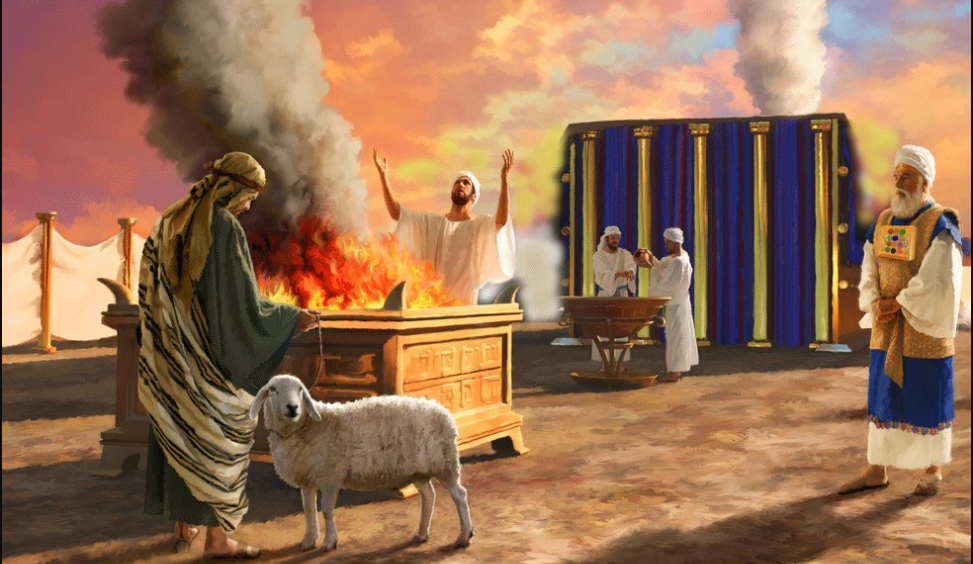Malachi 1:6-14
6 “‘A son honors his father, and a servant his master. Then if I am a father, where is My honor? And if I am a master, where is My respect?’ says the Lord of armies to you, the priests who despise My name!
But you say, ‘How have we despised Your name?’ 7 You are presenting defiled food upon My altar.
But you say, ‘How have we defiled You?’ In that you say, ‘The table of the Lord is to be despised.’ 8 And when you present a blind animal for sacrifice, is it not evil? Or when you present a lame or sick animal, is it not evil? So offer it to your governor! Would he be pleased with you, or would he receive you kindly?” says the Lord of armies.

9 “But now, do indeed plead for God’s favor, so that He will be gracious to us. With such an offering on your part, will He receive any of you kindly?” says the Lord of armies. 10 “If only there were one among you who would shut the gates, so that you would not kindle fire on My altar for nothing! I am not pleased with you,” says the Lord of armies, “nor will I accept an offering from your hand.
11 For from the rising of the sun even to its setting, My name shall be great among the nations, and in every place frankincense is going to be offered to My name, and a grain offering that is pure; for My name shall be great among the nations,” says the Lord of armies. 12 “But you are profaning it by your saying, ‘The table of the Lord is defiled, and as for its fruit, its food is to be despised.’
13 You also say, ‘See, how tiresome it is!’ And you view it as trivial,” says the Lord of armies, “and you bring what was taken by robbery and what is lame or sick; so you bring the offering! Should I accept it from your hand?” says the Lord. 14 “But cursed be the swindler who has a male in his flock and vows it, but sacrifices a blemished animal to the Lord, for I am a great King,” says the Lord of armies, “and My name is feared among the nations.”
Upon first reading this, you can’t help but think that God is angry. And he is angry because they are bringing lame sacrifices. God seems to be throwing his weight around. He is insulted at the lame sacrifices they give him knowing that they would not give those to the governor. But wait, didn’t God say he didn’t want their sacrifices?
Malachi 1:6-14 critiques the priests for offering blemished, lame, or unworthy sacrifices, which dishonor God. This passage reveals God’s frustration that Israel is offering polluted sacrifices that reflect their lack of reverence for Him. This contrasts with other scriptures where God emphasizes that He desires something deeper than ritual sacrifices—He desires mercy, obedience, and a pure heart.
Let’s compare Malachi 1:6-14 with other key scriptures that reflect this principal
Malachi 1:6-14 specifically addresses “the priests”, who were entrusted with the sacred duty of offering sacrifices on behalf of the people. Their failures are central to God’s complaint in this passage. Let’s begin there and explore this more fully.
Malachi 1:6-14: God Confronts the Priests

- Audience: The priests, as spiritual leaders, are held accountable for offering sacrifices that dishonor God.
- Issue: The priests are presenting blind, lame, and diseased animals—offerings that violate God’s commands (Leviticus 22:17-25) and reflect a deep disrespect for His holiness.
- “It is you priests who show contempt for my name. But you ask, ‘How have we shown contempt for your name?’ By offering defiled food on my altar.” (Malachi 1:6-7)
- God’s Rebuke: The priests treat God’s altar as unimportant, offering sacrifices they wouldn’t dare give to a governor:
- “Try offering them to your governor! Would he be pleased with you? Would he accept you?” (Malachi 1:8) God posits that they care more about what the world thinks of them than God. This ties directly back to the earlier verses about loving Jacob and hating Esau. God chose to love them but they are loving God back.
- Core Message: The priests’ actions expose a deeper problem—a lack of reverence for God and spiritual insincerity.
God holds the priests accountable because they set the tone for worship in Israel. As leaders, their dishonorable actions reveal not just personal failure but corruption in the worship life of the nation.
Comparison with Scriptures Where God Rejects Sacrifices
While Malachi condemns the priests for defective sacrifices, other scriptures show that God sometimes rejects sacrifices altogether when they are offered hypocritically or without genuine obedience
- Hosea 6:6 – “I desire mercy, not sacrifice.”
- Context: The people were performing sacrifices but neglecting covenantal love and mercy.
- Audience: God speaks to the nation of Israel but indirectly implicates the priests and leaders who facilitated hollow worship.
- Message: Sacrifices become meaningless when love, mercy, and faithfulness are absent.
- Isaiah 1:11-17 – “Stop bringing meaningless offerings!”

- Context: Israel continued offering sacrifices while committing injustice and oppression.
Key Idea: God rejects religious rituals when they coexist with corruption and sin “Your hands are full of blood! Wash and make yourselves clean. Stop doing wrong; learn to do right.”* - Connection to Malachi: In both passages, the external act of sacrifice is corrupted by the internal state of the heart—whether it be insincerity (Malachi) or hypocrisy (Isaiah).
- 1 Samuel 15:22 – “To obey is better than sacrifice.”
- Context: King Saul disobeys God and justifies his actions by claiming he saved animals for sacrifice.
- Message: God values obedience over ritualistic offerings. Disobedience cannot be excused by religious acts.
Half-Heartedness
In Malachi, the priests are not outright disobedient to the system of sacrifices, but they are treating it with carelessness and a lack of reverence, which reflects disobedience of heart.
- Micah 6:6-8 “What does the Lord require of you?”
- Context: The people ask what offerings would please God—thousands of rams or rivers of oil?
- Message: God does not desire extravagant sacrifices; He requires justice, mercy, and humility.
- Connection to Malachi: The priests in Malachi miss the point of worship by offering token sacrifices that dishonor God. True worship requires a heart of reverence and justice.
- Psalm 51:16-17 – “A broken and contrite heart you will not despise.”
- Context: David, after sinning with Bathsheba, acknowledges that God desires repentance more than offerings.
- Message: Sacrifices without genuine repentance are hollow.
Genuine Honor
In Malachi, the priests’ sacrifices are not just flawed but reveal a deeper spiritual issue—a lack of genuine honor for God. This parallels David’s insight that God is after authentic hearts.
Why Address the Priests Specifically?
In Malachi 1:6-14, God focuses on the priests because they are responsible for leading Israel’s worship:
- Spiritual leadership matters. If the priests show contempt for God, the people will follow suit.
- Their failure represents a failure of the whole worship system, as they facilitate unworthy sacrifices instead of upholding God’s holiness.
Key Takeaway

While God established the sacrificial system, He has always desired something deeper: a pure heart, obedience, and genuine reverence.
- In Malachi, God critiques the priests for treating sacrifices with disdain and dishonoring Him.
- In other scriptures (Hosea 6:6, Micah 6:8, Isaiah 1), God rejects sacrifices entirely when they are offered hypocritically or without moral integrity.
These themes are unified: Sacrifices are meaningless when the heart is insincere or corrupt. What God truly desires is faithfulness, mercy, obedience, and a heart that honors Him.
Final Thoughts
In Malachi 1:6-14, God begins by confronting the leaders—the priests—because they were supposed to teach the people and help them learn to love God from the heart. Instead, they compromised and accepted worldly standards as long as they benefited materially. The priests saw only the halfheartedness of the people because their own hearts were half-hearted. That’s why they didn’t challenge or correct the people’s flawed worship.
Rather than embracing the deeper purpose of God’s laws, they were merely going through the motions—fulfilling requirements without any heart behind it. Sacrifices were never the point. God’s vision for sacrifice was about shaping, cleansing, and purifying hearts. The process of sacrifice was meant to awaken people to the value of life and to the devastating reality that sin leads to death.
Here, the priests had become completely detached from the meaning of what they were doing. Their hearts weren’t in it. By treating sacrifices as a transaction, they missed the profound truth that God intended worship to be about transformation, reverence, and a love that comes from the heart.
